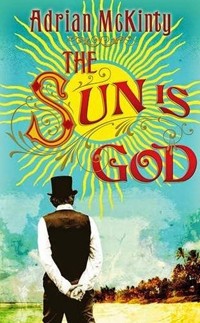Adrian McKinty has made his name with three crime trilogies, the latest of which featured Catholic cop Sean Duffy in the midst of sectarian turmoil in 1980s Belfast. So, The Sun is God is a bit of a departure. Here we meet Will Prior, once a junior officer in The Military Foot Police who served during The Boer War.
When he becomes involved in a serious incident at a concentration camp set up by the British to contain the Boers near Bloemfontein, he becomes a hero overnight, at least in the eyes of his military superiors. For Prior, however, it is the start of a nightmare both literal and metaphorical. Angrily casting aside his Distinguished Service Order he gets himself dismissed from service and seeks a new life in the colonies.
Prior fetches up in a place which McKinty describes (from personal experience) as being as close to hell on earth without there being devils dancing around with sharp tridents. German New Guinea in 1906 was hot, wet, malarial and home to every kind of flying, stinging, scuttling insect and arthropod. Prior is manager of an ailing rubber plantation near the principal settlement of Herbertshöhe. His days are spent languidly enough, living with his native servant-mistress, Siwa, but his peace is disturbed when government officer Hauptmann Kessler seeks his assistance.
Prior’s police background is useful to the colonial administrators. Corpses are ten-a-penny in Herbertshöhe, but one particular mortuary resident is causing Governor Hahl concern. On a tiny island ten miles away, an eccentric group of sun worshippers have set up a community dedicated to becoming one with nature, and eating only coconut. They call themselves The Cocovores. One of them has died, ostensibly of malaria, and the corpse has been sent back to the main island for burial. The postmortem reveals that Herr Lutzow actually died from drowning so Governor Hahl despatches Prior, Kessler, and a visiting English anthropologist, Bessie Pullen-Burry, to investigate.
The mismatched trio find a bizarre world of nakedness, drug taking, totem worship, and a relaxed view of sexuality. Alarmingly, Miss Pullen-Burry begins to join in, while Prior and Kessler struggle with both the debilitating climate and the charismatic Cocovore leader – August Englehardt. Answers of any kind, let alone straight ones, about the death of Lutzow are impossible to find.
Surprisingly, many of the characters in The Sun is God actually existed, and the broad events described are largely factual. In the author’s preface, however, he states that ‘where the interests of the novel and strict historical accuracy have collided I have put the demands of the former first.’
Don’t be deterred by McKinty’s enigmatic assertion that the crime remains unsolved to this day. Here, the crime is solved, and with great effect, in one of the best climaxes to a novel I have read in a long time. I do wonder if this is more a period drama than a crime novel, but of one thing I am certain – this is brilliant writing. There is wonderful sleight of hand in the final pages, when rescue comes from an unlikely source. McKinty handles the mood and tone like a master. There is wry comedy, social satire, horror, compassion and tension. This is a brave and successful change of direction from a fine writer, who spoke to us about his earlier work here.
Serpent’s Tail
Print/Kindle
£2.57
CFL Rating: 5 Stars











so nice to get this review! and so nice you liked the book. As you can probably gather this was a pretty fun one for me to write. And yeah you’re right, I suppose its 60 – 80% true…so kind of a bit of a cheat to say that I used a lot of imagination…
Anyway thanks for the review, I really appreciate it.